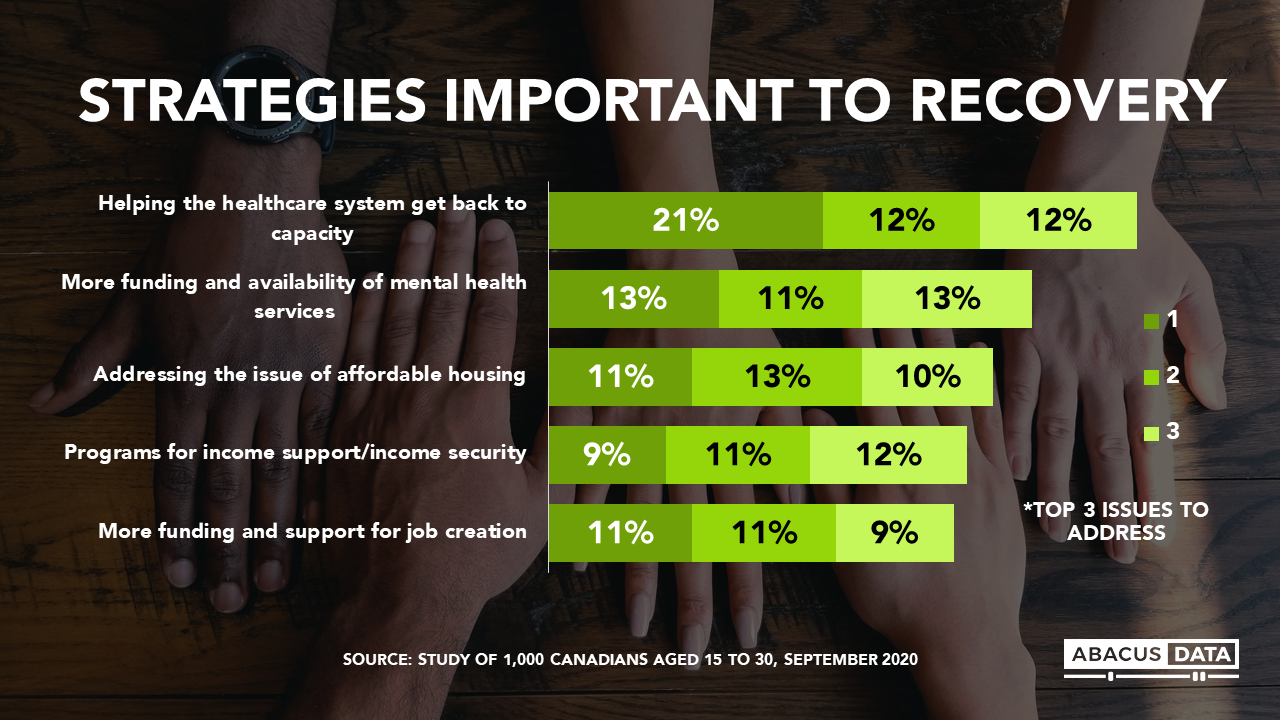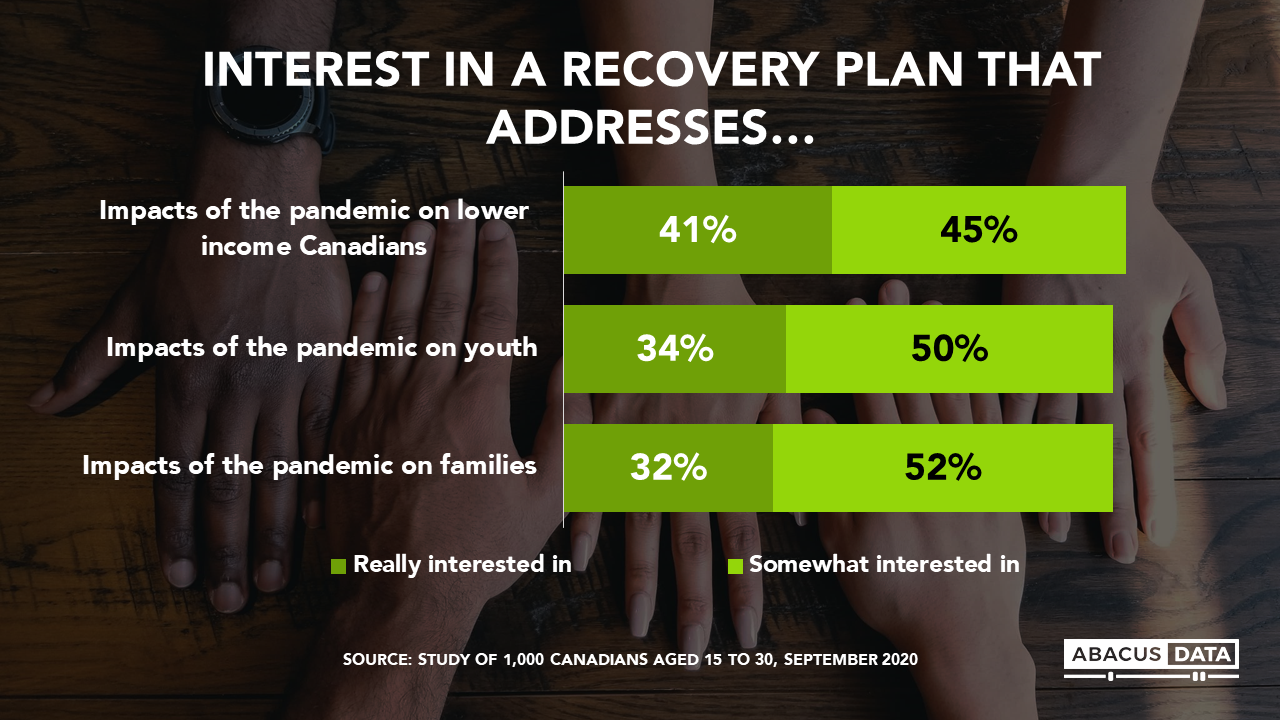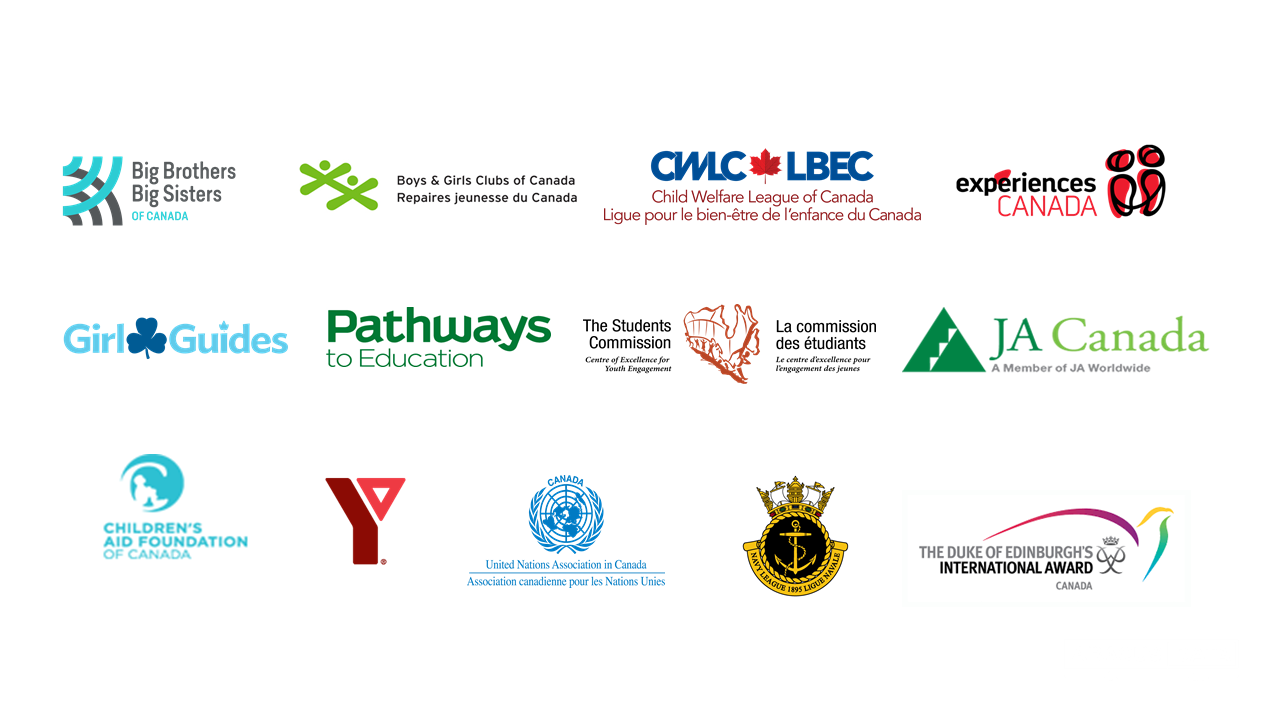COVID-19 & Canadian Youth: Impacts, Perspectives and The Recovery
November 17, 2020
In September 2020 Abacus Data partnered with 13 youth-serving agencies to undertake a survey of Canadian youth aged 15 to 30. We wanted to better understand the experiences of the COVID-19 pandemic thus far, as told by Canadian Youth.
Here’s just some of what we found. (To read the full report, click here) (And click here for the French version)
1.The pandemic has caused fundamental shifts to education, employment, and financial situations of Canadian youth, but above all else it has fundamentally altered the structure of their lives and the supports they can access. The COVID-19 pandemic has shifted the very framework of young Canadian’s lives.
Two-thirds of youth who are in school say the pandemic situation has made it more difficult for them to learn. And 67% are struggling to access the supports they need to learn as a result. Half have started rethinking their plans for education.
Well over half of youth (58%) say the pandemic has impacted their financial situation. In particular, youth employment remains a challenge. 61% have faced difficulties with employment including fewer hours, job loss or absence of seasonal work.
60% say they are feeling disconnected from family and friends. Despite being digital natives, 2 in 5 say the shift to digital interactions has made it more difficult to connect with friends while 1 in 4 report it being more challenging to connect with family or caregivers.
2.Aside from a global pandemic there have been growing concerns about other issues in our society, and Canadian youth are paying attention to these too. These have added compounding stresses to the lives of youth.
Looking beyond the direct consequences of the pandemic, youth are increasingly worried about other social issues too. At least half of Canadian youth have become more worried about the financial stability of our society, racial inequalities, impacts of socio-economic status, and climate change in recent months.
And Canadian youth don’t believe these issues are mutually exclusive from the pandemic. Half of Canadian youth say the pandemic has just exposed -pre-existing inequalities in our society.

This link between social inequalities and the pandemic’s impact are already a reality for many Canadian youth. The pandemic has only exacerbated the inequalities faced by youth from marginalized groups.
Youth who identify as a racial/ethnic minority face greater struggles with their social connections (by 13 pts), are less satisfied with their mental health (by 8 pts), and are more stressed about their futures (by 12 pts). **compared to those who do not identify as a racial/ethnic minority.
Youth who are from lower income households (under 18), are less content with their lives today (by 12 pts), feel more lonely/disconnected from their networks (by 11pts), and are more stressed about their futures (by 16 pts). ** compared to those who are not from lower income households.
3. Youth want a comprehensive recovery policy that focuses on those most in need, providing long-term solutions that not only address the consequences of the pandemic, but the pre-existing inequalities as well. Youth want a plan that deals with the issues faced by their peers but one that doesn’t leave anyone out, particularly those in marginalized communities and those who were facing challenges even before the pandemic began.
Asked to pick the most important strategies for a recovery, youth want the government’s recovery strategy to focus on: helping the healthcare system get back to capacity; more funding for mental health services and; addressing the issue of affordable housing.

They are also keenly interested in a plan that focuses on those most in need, addressing the pre-existing inequalities they see in society, including 86% are interested in a strategy that focuses on low-income Canadians.

This study was made possible by the following organizations:

ABOUT ABACUS DATA
We are the only research and strategy firm that helps organizations respond to the disruptive risks and opportunities in a world where demographics and technology are changing more quickly than ever.
Find out more about what we are doing to help clients respond to the COVID-19 pandemic.
We are an innovative, fast-growing public opinion and marketing research consultancy. We use the latest technology, sound science, and deep experience to generate top-flight research-based advice to our clients. We offer global research capacity with a strong focus on customer service, attention to detail and exceptional value.
We were one of the most accurate pollsters conducting research during the 2019 Canadian Election.

Contact us with any questions.
Find out more about how we can help your organization by downloading our corporate profile and service offering.
METHODOLOGY
The web survey was conducted with 1,000 Canadian youth aged 15 to 30 from September 9th to 16th 2020. A random sample of panelists were invited to complete the survey from a set of blended panels.
The margin of error for a comparable probability-based random sample of the same size is +/- 3.1%, 19 times out of 20.
The data were weighted according to census data to ensure that the sample matched the target population according to age, gender, educational attainment, and region. Totals may not add up to 100 due to rounding.



